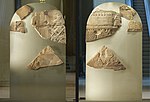A stele (/ˈstiːli/ STEE-lee), from Greek στήλη, stēlē, plural στήλαι stēlai, is a stone or wooden slab, generally taller than it is wide, erected in the...
37 KB (3,985 words) - 05:39, 30 October 2024
The Sfire or Sefire steles are three 8th-century BCE basalt stelae containing Aramaic inscriptions discovered near Al-Safirah ("Sfire") near Aleppo, Syria...
14 KB (1,592 words) - 14:14, 23 August 2024
Clermont-Ganneau, an archaeologist based in the French consulate in Jerusalem. The next year, the stele was smashed into several fragments by the Bani...
57 KB (6,383 words) - 18:11, 29 October 2024
The Stele of the Vultures is a monument from the Early Dynastic IIIb period (2600–2350 BC) in Mesopotamia celebrating a victory of the city-state of Lagash...
12 KB (1,425 words) - 10:42, 12 October 2024
Emmanuel de Rougé published a complete word-by-word translation in French in 1876. The stele inscription describes Piye as very religious, compassionate, and...
3 KB (247 words) - 23:27, 22 June 2024
Xi'an Stele or the Jingjiao Stele (Chinese: 景教碑; pinyin: Jǐngjiào bēi), sometimes translated as the "Nestorian Stele," is a Tang Chinese stele erected...
31 KB (3,426 words) - 07:36, 12 November 2024
boundary of the stele. Outside the stele lies the endodermis, which is the innermost cell layer of the cortex. The concept of the stele was developed in...
7 KB (926 words) - 10:18, 18 May 2024
The Beisan steles are five Ancient Egyptian steles from the period of Seti I and Ramesses II discovered in what was then known as Beisan, Mandatory Palestine...
9 KB (960 words) - 13:23, 11 September 2024
king. Broken pieces of this stele were found in the 3rd pylon of the temple of Karnak at Thebes between 1947 and 1951 by French archaeologists. It was restored...
15 KB (1,703 words) - 18:59, 21 September 2024
The Cirta steles are almost 1,000 Punic funerary[citation needed] and votive steles found in Cirta (today Constantine, Algeria) in a cemetery located...
21 KB (1,633 words) - 20:57, 3 August 2024







